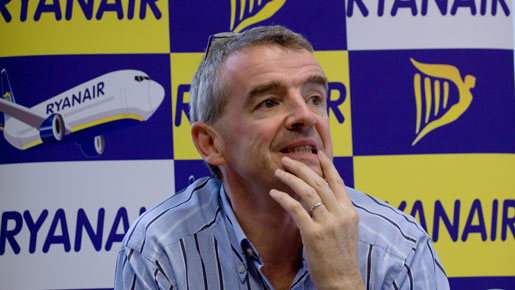
Irish airline Ryanair brought forward plans to pay its first dividend since being floated in 1997 as it swung back to a full-year profit ahead of most rivals and expected to grow earnings further this year.
Europe’s biggest low-cost carrier earlier said it could end its no-dividend policy around 2013 when it will scale back growth, though some analysts have thought the comment was a move in its bargaining with Boeing over aircraft orders.
“People often listen to what Ryanair says and say this is just palaver or putting it on,” Deputy Chief Executive Michael Cawley told reporters.
“It’s probably come a little bit sooner than others would have expected but notwithstanding that, it’s here for real now,” he said of the dividend.
Ryanair expects to generate up to one billion euros of surplus cash by the end of 2013, of which he would propose to pay 500 million in a one-off dividend in October 2010 and possibly another 500 million later as a dividend or share buyback.
Ryanair, which is vying with Deutsche Lufthansa for the position of Europe’s biggest airline by market value, has not paid dividends in the past but it has spent more than 300 million euros on share buybacks in the past three years.
Ryanair, which last year posted its first loss in 20 years after writing down the value of its stake in former takeover target Aer Lingus, has posted an adjusted net profit of 319 million euros ($391m) for the year to the end of March, before writing down another 13.5 million for Aer Lingus.
That compared with analysts expectation for a net profit of 311.74 million euros according to the average of 18 forecasts and Ryanair’s own projection in April for at least 310 million euros in net profit.
Bookings not fantastic
Ryanair expects profit in the coming year to rise by between 10 and 15 percent excluding exceptional costs from disruptions caused by a volcanic ash cloud which drifted over European airspace from Iceland.
It estimated the ash-related costs so far at about 50 million euros.
Cawley said forward bookings for the summer period, which generates a big bulk of earnings, were looking “reasonable” but “not fantastic” and he was not expecting the European economy to return to healthy growth for at least six to 12 months.
Ryanair, which has some of the industry’s lowest costs, has thrived in the recession, while legacy carriers and weaker low-cost airlines struggled.
British Airways posted a record full-year loss and its ambitions to break even next year were seen threatened by strikes, which non-unionised Ryanair has been immune from.
Cawley said however: “In a more long-term scenario we’d prefer if the economy returned to some growth and demand picked up. Ultimately we need people to travel and we need them to pay fares.”

